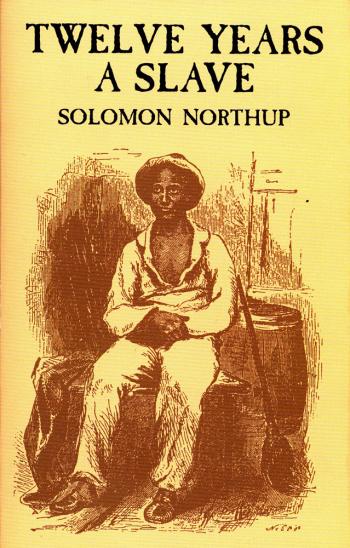Solomon Northup descendant visits, meets Epps descendant
Holding in her trembling hands the document detailing the legal order that led to her great-great-great-grandfather’s release from slavery in Avoyelles Parish, Eileen Jackson could not contain the tears.
“This is making me shiver,” she said as she read sat in the Clerk of Court’s office in the courthouse in Marksville and read the motion concerning Solomon Northup. “I can’t even speak.”
She apologized for breaking up, saying she did not expect to get that emotional.
Ms. Jackson was in Avoyelles to visit important sites in her famous ancestor’s 12 years as a slave. He had been kidnapped in Washington D.C and sold into slavery in Louisiana, spending 9 of his 12 years of bondage in Avoyelles. He was finally freed at the Avoyelles Parish Courthouse in 1853.
Because Northup was educated, he was able to write the story of his experiences in his autobiography, Twelve Years a Slave, which gives one of the few firsthand accounts of slavery from someone who lived as a slave. His story was resurrected and brought into the limelight with the recent Academy Award-winning movie. The subsequent publicity and interest in Northup resulted in his descendants wanting to visit Avoyelles.
Ms. Jackson, 59, lives in Alta Dena, California, near Los Angeles. She was the first descendant to ever return to Avoyelles since her ancestor was freed here 161 years ago. She was a guest of honor at the Solomon Northup Symposium held in Bunkie on Oct. 18.
She started her day at 9 a.m. with a visit to Epps Plantation site on Bayou Bouef with Mayor Mike Robertson and then proceeded through other stops on “The Northup Trail.” Ms. Jackson said she had heard a little bit about Solomon Northup when she was growing up, but not a lot. It wasn’t until 1999, when she attended the first “Solomon Northup Day” observance in his native Sarasota Springs, N.Y., that she got interested in his story.
They unveiled a marker commemorating his story, so she read the annotated version of Twelve Years a Slave by Dr. Sue Eakin. “That’s when I became proud to be one of his descendants,” she said. “I had seen a movie about him in 1984 with Avery Brooks playing Solomon,” she said, “but it hadn’t really impressed on me the desire to know more.”
That PBS production, Solomon Northup’s Odyssey, aired in 1984 and again in 1985. It was released on video under the title Half Slave, Half Free.
“I had wanted to come here and go to the Epps Plantation where he lived and worked,” Ms. Jackson said. “Strangely, it didn’t move me half as much as seeing those documents in my hand.”
A chance encounter at the courthouse also made the visit especially memorable. Kellina Vanpool was in the Clerk of Court’s office doing family research when she overheard Judge Billy Bennett saying Ms. Jackson was a descendant of Solomon Northup.
Ms. Vanpool came up to her and introduced herself as a great-great-great-great-niece of Robert Epps -- the youngest son of plantation owner Edwin Epps. Robert was born while Northup was enslaved at the Epps place. He was three when Northup was freed. Both women embraced and cried over their families’ unfortunate connection.
Ms. Vanpool had been in touch with Ms. Jackson’s sister, Evelyn, by email and Facebook. Ms. Vanpool, who lives with her husband at the U.S. Army’s Fort Hood near Killeen, Texas, said she was in Louisiana doing research on the Cheney side of her family tree and had just come back from Opelousas where she had found the marriage license of Robert Epps and Harriet Cheney.
She did not know about her family’s history until she was assigned to read Northup’s autobiography in college.
“I started recognizing names and then realized this was my family,” she said. Ms. Vanpool said she has drawn strength from Northup’s trials during her own life’s storms. “If he could survive what he went through, then my problems are small in comparison,” she said.
Ms. Jackson said she was impressed with the landscape of the area, how tall the cane is, and just the beauty of the parish. However, what impressed her the most about her visit -- besides the historical information she gathered -- was the friendliness and helpful attitude of so many people she met here.
Ms. Jackson said she believes it is important for people to trace their genealogy as much as possible “to know your family history.” She said Solomon’s father, Mintus, was freed in the will of his master when that man, whose last name was Northup, died. Mintus took his former master’s last name and began his life as a free man in America.
Solomon was born a free man. He grew up, got married, had three children and then was drugged and kidnapped on the streets of the nation’s capital.
Ms. Jackson’s connection to Northup goes like this: Solomon Northup (gr.-gr.-gr.-grandfather), Alonzo Northup (gr.-gr.-grandfather), John Henry Northup (great-grandfather), Victoria Northup Linzy (grandmother), Alice Linzy (her mother).
The Brad Pitt movie has brought a lot of attention to Northup’s story, she said. “The last Solomon Northup Day I attended, they brought more seats into the auditorium and it was still filled to the brim,” Ms. Jackson said. “It is good to see more people are being enlightened about his life.”
She said she will definitely return, bringing more relatives with her, in the near future.
- Log in to post comments

